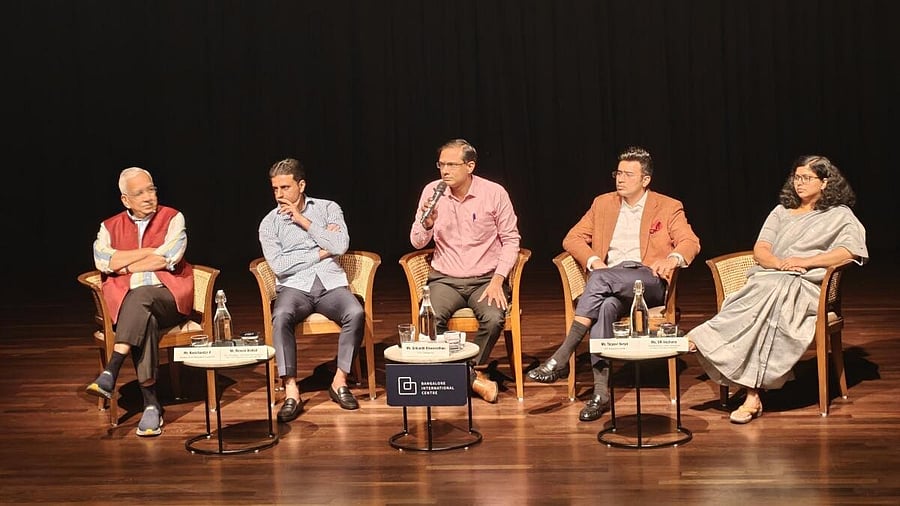
Panel discussion held at Bangalore International Centre about the Greater Bengaluru Governance Act.
Credit: DH Photo
Bengaluru: The city's urban evangelists congregated at a dialogue series, held in the city on Saturday, hoping to expand the civic space through informed, constructive conversations connecting policy, practice, and public discourse.
The inaugural session, held at Bangalore International Centre in collaboration with Janaagraha, brought together leaders across the political spectrum to discuss and debate what really the Greater Bengaluru Governance (GBG) Act: India’s first metropolitan governance framework, can deliver to citizens. The discussion focused on four key areas: Planning and mobility, citizen-centric governance, transparency, and ward committees.
In a session titled, 'The Bengaluru Debates', the panellists included Tejasvi Surya (MP, Bengaluru South), Rizwan Arshad (MLA, Shivajinagar, and Chair of the Joint Select Committee on the GBG Bill 2024), . Ravichandar (Member, Brand Bengaluru Committee), and VR Vachana (Associate Director–Policy, Janaagraha). The session was moderated by Srikanth Viswanathan, CEO, Janaagraha.
The session took off on a high note with Tejasvi Surya arguing that the GBG Act centralises power and fails to empower mayors, calling it an unnecessary bureaucratic layer. Rizwan Arshad countered the argument stating that the GBA Act aims to decentralise, integrate, and coordinate multiple agencies such as BMRCL, BWSSB, BESCOM, and BMTC. He highlighted the new requirement for monthly coordination meetings to prevent overlapping work, like road relaying and pipeline digging.
V Ravichandar, involved in drafting the Bill, called the Act a bold experiment in metropolitan governance, stressing that success would depend on implementation and citizens’ adherence to the rule of law. He noted that accountability now lies directly with the Chief Minister and Deputy Chief Minister. Vachana added that while Bengaluru needed a unified body, the new metropolitan committee’s jurisdiction remains smaller than that of the BDA.
Tejasvi Surya calls for better public transport
Tejasvi Surya consistently criticized the Congress’s proposed tunnel road project. He argues that rather than focusing on underground tunnels or hanging corridors, the priority should be on making public transport more accessible to people. He calls for greater transparency from the Bangalore Metropolitan Transport Corporation (BMTC) regarding their live tracking of buses and expediting the suburban rail project.
Surya has strongly opposed the tunnel project, particularly the section planned to run beneath the Lalbagh Botanical Garden, which he refers to as “one of the last large green patches in the city.” He has also challenged Deputy Chief Minister DK Shivakumar's claim that only a small portion of Lalbagh would be affected by the tunnel. “We will fight against them and make sure they do not touch even an inch of Lalbagh,” he declared.
